Words and Expressions Class 10 Solutions Unit 1 A Letter to God
Let’s Begin:
Question 1.
You have read about Lencho in ‘A Letter to God’, First Flight, textbook in English for Class X. How has the story of Lencho moved you ? What do you think about Lencho’s faith in God and his attitude towards the officials in the post office ? Do you think he is right in asking God for support and then blaming the people at the post office ? Discuss his actions with your friends. Why does he do so ?
Answer:
Lencho was a poor farmer. He was quite hardworking too, an ox of a man. Due to severe rain and hailstorm his ripe corn crops were badly damaged and ruined. He got worried and anxious at this grave loss as that meant that his family would have to go hungry that year. Lencho had a firm faith in the Almighty and believed that only God could help him out of this bad situation. With great hopes he decided to write a letter to God to compensate him for the loss that he had suffered. It was naivety and sheer innocence on part of Lencho to ask and expect monetary and financial help from God. Lencho was a sincere, responsible and hardworking fellow.
He had devoted his utmost and sincerest efforts in sowing his crop fields. He could not imagine and believe all his efforts going waste in the wink of an eye. As a responsible fellow he was really concerned about the well being of his family and couldn’t bear to see them embroiled in any kind of difficulty. It was out of care, compassion towards his loved ones that he tried to do something unusual and out of the ordinary i.e. writing a letter to an invisible force that he thought is omni present. I feel great sympathy for the poor fellow as he had to suffer the loss for reasons that were out of his control. However, I also feel that it was quite inappropriate and unreasonable on part of Lencho to blame the post-office staff for the inadequate amount of money that he had received. The post office employees did nothing wrong but tried to help the poor fellow by doing their best. Lencho should have thanked God and the post-office staff for receiving such great assistance at the time of need.
Question 2.
The summary of the story of Lencho is given below. The sequence of the story is jumbled up.
Read the story again and rearrange the jumbled sentences to make a coherent story.
| Write the correct order in numbers in the column below | Jumbled sentences |
| (i) | But it rained heavily and hailstorm thrashed his corn field and all the corn was destroyed. |
| (ii) | He wrote ‘To God’ on the envelope and posted it. |
| (iii) | Lencho predicted it will rain and it did. He and his wife were happy. |
| (iv) | Lencho felt desperate but believed that God would help him. |
| (v) | Their corn field was longing for water. |
| (vi) | The postman and the postmaster laughed at Lencho’s letter but were surprised by the faith of the man. |
| (vii) | He wrote a letter to God asking for a hundred pesos to sow his field again and to survive until the next crop came up. |
| (viii) | After some days, Lencho went to the post office to receive the money as the postmaster watched him. |
| (ix) | He immediately went to the counter and asked for a pen and paper, wrote a few lines and posted the letter. |
| (x) | Lencho, his wife, and their children lived in a lonely house in a valley. |
| (xi) | When the postmaster opened the letter, it said “Oh! Thanks for sending the money. But I have received only seventy pesos. Next time you please send the money directly to me. The people at the post office are a bunch of crooks. They have taken the thirty pesos. |
| (xii) | He opened the letter and was happy to find the money. He counted and found it was only seventy pesos. |
| (xiii) | The postmaster collected about 70 pesos from his colleagues and sent it to Lencho. |
Answer:
(i) 4
(ii) 7
(iii) 3
(iv) 5
(v) 2
(vi) 8
(vii) 6
(viii) 10
(ix) 12
(x) 1
(xi) 13
(xii) 11
(xiii) 9.
Create a graphic description based on the given summary of ‘A Letter to God’.
A. Lencho in his corn field.
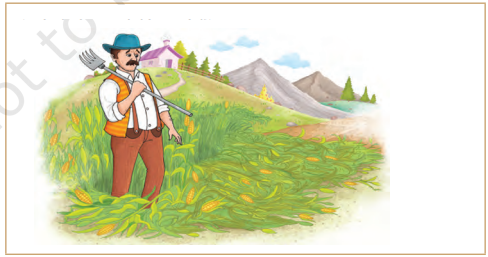
B. Lencho writing letter to God asking for compensation.
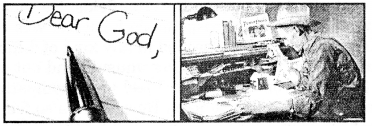
C. The Post-master surprised to read the letter and the other staff also astonished.

D. Post office employees helping Lencho by providing monetary help that he had asked for.
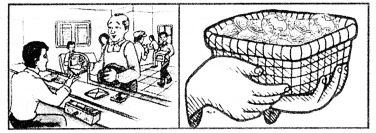
E. Lencho surprised on receiving a sum less than what he had asked for; decides to write another letter to God complaining about the same.
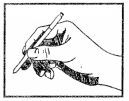
Reading Comprehension:
Text – I
Given below is a story of the tailor who has been known for his skills in cheating and stealing. Read in groups of four or in pairs. You may discuss the events and incidences of the story with your friends and write them in a sequential manner.
The Trader and the Tailor:
There was a tailor who was known for beating others in the art of being light-fingered and thievery. A trader swore that even with a hundred attempts, the tailor would not be able to take a coil of thread from him without his knowledge.
The trader was told that many others, more intelligent than him, had been beaten by the tailor. They said he should not imagine himself so great, for his ego would only give him worse troubles in competition with the tailor. Still, the trader became more competitive and made a wager that the tailor would not be able to rob him of anything.
He wagered an Arab horse with those who taunted him. If the tailor failed to steal, then they would have to give him a horse instead. That night, the trader lay awake troubled by the situation and could not sleep a wink.
In the morning, he put a piece of satin cloth under his arm and went to the bazaar and entered the shop and saluted the cunning rogue warmly. The tailor sprang up from his seat and welcomed the trader, inquiring about his health with cordiality exceeding even that of the trader, planting in his heart great feelings of affection for him. When the trader heard these songs of sweetness from the tailor, he flung down the piece of silk saying, “Cut this into a coat for me and make it wide below my navel so as not to hamper my legs and tight about it to show off my figure.”
The tailor answered, “O! kindly man, I will do you a hundred services,” and accepted the order. He measured the satin and inspected the working surface and all the time chatted away to the trader in idle gossip, about other amirs and of bounties and gifts he had received from them, and about misers and their mean ways, and made the trader laugh with hysterics. During this beguiling talk, he was snipping away with his scissors rapidly, cutting as fast as his lips moved.
The trader was laughing, the tailor was cutting, the trader closed his eyes in joy, the tailor cut extra pieces, tucking them under his thighs, hidden away from all but God. From his delight at the tailor’s tales, the trader’s former boast went out of his mind. What satin? what boast? What wager? The trader was drunk on the jokes told by the tailor.
Then the tailor told such an incredible story that the trader fell over on his back with laughter. The tailor swiftly stitched a swatch of the satin to the hem of his underpants while the trader was paying no attention at all, greedily sucking with every guffaw at the jests the tailor told. The tailor continued to tell funnier and funnier tales and jokes until the trader was completely within his power.
With his eyes shut and his reason vanished, the bewildered and boastful trader was drunk with joy. And the tailor continued to cut, filching yet more of the beautiful cloth, with nothing to stop him now. And yet the trader begged for more.
You who becomes the slave of the jest, no story is more laughable than you yourself, think on this at the edge of your grave. How long will you listen to the lies of this world that leave your mind and spirit unhinged ? The Universal Tailor will cut and stitch the hems of a hundred travellers, silly as children.
Eventually the tailor became bored with the whole story and told the trader that he better leave before another tale was told, “For if I tell another one, the coat will be too tight for you, and you will stop laughing and weep tears of blood.”
by Rumi (Abridged)
Did you enjoy the story of ‘The Trader and the Tailor* ? The story is summarised below. Read the story again with your friend and complete the paragraph using short sentences with the given hints.
Once there was a tailor who was known for ___________ (cheat and thievery). He could cheat anyone with his cunning way of deceiving people. A trader challenged that the tailor would not be able to cheat him. He ___________ (go) to the tailor with ___________ (satin). The tailor ___________ (welcome). The trader (please) by the tailor’s praise. He told the tailor to make a coat for him. The tailor ___________ (praise) the trader (maximum). The trader ___________ (joy). The tailor ___________(recount) funny tales and the trader forgot ___________ (bet). The tailor started snipping ___________ and ___________ hide). Eyes of the trader ___________ (tears and joy) and yet the trader kept on asking for ___________ (stories). At last, the tailor told the trader that (tight) and ___________ (weep-blood).
Answer:
beating others in the art of cheating and thievery, went, a piece of satin tucked under his arm, welcomed him with great cordiality, was very pleased, praised, to his maximum, experienced great joy, recounted innumerable, about the bet completely, the cloth rapidly, tucking in the extra pieces under his thighs hiding from the trader, more and more, if he told another story the coat would be too tight for him, he would weep tears of blood.
Vocabulary:
Question 1.
In this story you have come across a word “light-fingered” which means inclined to steal things. Some such words are given below. Use appropriate words and fill in the blanks.
light-headed, light year, light-hearted, light sleeper, light-duty
(a) The ___________ is a unit of distance used to measure distance in space.
(b) The farmer bought a ___________ truck to transport their produce, as it uses less dies.el.
(c) We had a fairly ___________ discussion with our colleagues. .
(d) Rita felt dizzy and ___________ after skydiving.
(e) He is a ___________, a slightest noise wakes him.
Answer:
(a) light year
(b) light-duty
(c) light-hearted
(d) light-headed
(e) light sleeper
Grammar:
Question 1.
You have come across Relative Clauses in the lesson ‘A Letter to God’. Read about the relative clauses again. Complete the sentences given below in the table by adding the most suitable clause from the box and make it a relative clause. The first one has been done for you.
contains meaning of word stitches clothes tell lies won the best actor award this year hit a century is faithful need to fill in the application is a crook help themselves won the nobel prize believe in hard work.
(а) A tailor is a person who stitches clothes.
(b) A dictionary is a book ___________
(c) The book is about a scientist ___________
(d) What is the name of the player ___________
(e) I don’t like people ___________
(f) What is the name of the actor ___________
(g) Students ___________ should meet the principal in her office.
(h) Friends of the trader thought the tailor ___________ and can cheat anyone.
(i) Lencho ___________ thought God would help him.
(j) Those ___________ will succeed.
(k) God helps those ___________
Answer:
(b) which contains meaning of words
(c) who won the nobel prize
(d) who hit a century
(e) who tell lies
(f) who won the best actor award this year
(g) who need to fill in the application
(h) who is a crook
(i) who is faithful
(j) who believe in hard work
(k) who help themselves
Editing:
Question 1.
Suppose Lencho gets a hundred pesos in his envelope. He writes a letter to God expressing his gratitude. However, he has missed a word in each line. Help him with those words so that his letter is complete.
Dear God!
Thank for – Thank you for
(а) sending a hundred pesos help. ___________
(b) I am very for this kind gesture. ___________
(c) You were my only and your ___________
(d) help has my faith in you. ___________
(e) This money will help me until the crop ___________
(f) and I promise to hard in the future. ___________
Sincerely yours,
Lencho
Answer:
(a) sending me a
(b) very grateful for
(c) only hope and
(d) has increased my
(e) crop comes/grows
(f) to work hard.
Listening:
Question 1.
Here is an interesting story. The story has been told in two ways. Story A has all the odd sentences (1,8,5,…) and story B has the even sentences (2,4,6,…). Working in pairs, one of you take up Story A and the other take up Story B. The person with Story A will read out the first sentence and the partner (person with story B) will write in the space provided. Then the person with Story B will read sentence two and the partner will write in the space for sentence two. Likewise complete the whole story. Once the story is completed, both of you will read out to each other to check whether you have listened carefully to your partner and written the complete story.
Story – A
The Race:
1. Every evening the animals of the Machlipatti used to sit under the banyan tree.
2. _____________________
3. He said, “Let’s run a race!” “Who will run a race with you ?
4. _____________________
5. Choo-Choo, the rat, shouted, “No, he’s not the fastest runner.
6. _____________________
7. Everyone laughed at him.
8. _____________________
9. The starting point was the peepul tree and the finishing point was the neem tree.
10. _____________________
11. Kho-Kho and Choo-Choo started running.
12. _____________________
13. “He must be far behind.”
14. _____________________
15. He shouted, “I’ve won the race! I’ve won the race!”
16. _____________________
Story – B
The Race:
1. _____________________
2. One day Kho-Kho, the rabbit, was feeling bored.
3. _____________________
4. No one can run faster than you,” said Bhalu, the bear, eating a mango.
5. _____________________
6. I can run faster than him.”
7. _____________________
8. Then it was decided to have a race between Kho-Kho and Choo-Choo.
9. _____________________
10. Coocku, the cock, crowed to start the race.
11. _____________________
12. After running half the distance, Kho-Kho looked back but Choo-Choo was nowhere to be seen.
13. _____________________
14. When he was near the finishing point, Choo-Choo jumped over Kho-Kho’s shoulder and touched the neem tree first.
15. _____________________
16. Everyone cheered for Choo-Choo.
Note : Do it yourself.
Speaking:
Question 1.
Lencho, the main character in the story, is a farmer. He supports his family through farming. The conflict in the story happens when a hailstorm strikes the field and destroys his farm. All the hard work, for nothing! The entire land is wrecked by catastrophe. There is no one who can help. Lencho’s complete faith in God is amazing during the calamity.
So, one type of conflict dominating in the story is man versus nature. Discuss with your partner the natural calamities that play havoc in the lives of people. Collect photographs and make a visual presentation to share in the class.
Answer:
A natural disaster is a major adverse event resulting from natural processes of the Earth. Examples are : floods, hurricanes, tornadoes, volcanic eruptions, tsunamis and other geologic processes.
A natural disaster can cause loss of life or damage property and typically leaves some economic damage in its wake the severity of which depends on the affected population’s resilience and also on the infrastructure available.
Earthquake : An earthquake is the result of a sudden release of energy in the Earth’s crust that creates seismic waves. At the Earth’s surface, earthquakes manifest themselves by vibration, shaking, and sometimes displacement of the ground. Earthquakes by themselves rarely kill people or wildlife. It is usually the secondary events that they trigger such as building collapse, fires, tsunamis and volcanoes. Many of these could possibly be avoided by better construction, safety systems, early warning and planning.

Flood : A flood is an overflow of water that ‘submerges’ land. Flooding may result from the volume of water within a body of water, such as a river or lake, which overflows, causing some of the water to escape its boundaries.
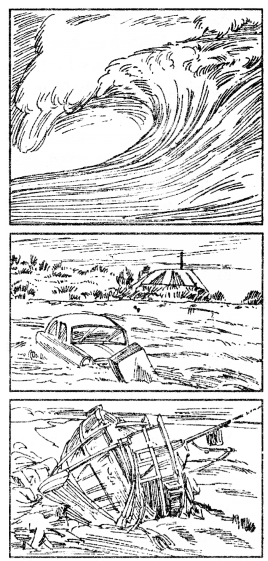
Floods have large social consequences for communities and individuals. As most people are well aware, the immediate impacts of flooding include loss of human life, damage to property, destruction of crops, loss of live stock, and deterioration of health condi tions owing to waterborn diseases.
Question 2.
Try writing a small poem on the topic man versus nature. Read aloud the poem with the required stress and intonation. Given below is a poem written by Norman Littleford, which may help you think and compose.
Man vs Nature:
The heavens roared with thunder
as lightning filled the skies
was this God getting angry
or Nature’s big surprise.
Is Mother Nature telling us
the best way that she can
to stop the interference
and abuse she gets from man.
We marvel at her beauty
each time we look around
then dig up all her treasures
from their natural burial ground.
We forget that Nature gives us
all that keeps us living
we take it all and still want more
but never think of giving.
We build across the countryside
progressing every day
but Mother Nature can’t progress
for man is in the way.
by Norman Lulls ford
Answer:
Man vs Nature:
Mother Nature cradles the human life
giving endless care for humanity to thrive.
Pouring generously from its womb,
the elixir of life.
But man’s never ending torture is rife,
his ever growing greed pushing the mother
to her tomb.
Man is wild, an erroneous child.
By ripping the nature of all its resources,
he is planting the seeds of his own remorses.
Mother Nature is loving and forgiving
and could only curse herself for her faulty upbringing.
She weeps in silent tears,
but doesn’t complain about her wears.
It’s time man gives nature its due respect
and doesn’t mar it for its ulterior prospects
He must realise and stop being naive…
With his selflish acts he is digging his own grave. – Moina
Writing:
Question 1.
The tailor here is a cheat, but Lencho in the story, ‘A Letter to God’, is naive and simple. He has immense faith in God. How do you distinguish between Lencho and the tailor? What makes them different ? Working in pairs, list the actions and qualities of Lencho and the tailor and draw their character sketches. The given cues will help you to draw a character sketch of these characters.
| Action: What does the person do ? | What quality it reveals? |
| Lencho lost all his crops. He is helpless. Prays to God | ___________________ |
| How does he manage the situation ? | ___________________ |
| Does he harm anyone by his action ? | ___________________ |
| How do others think of him ? | ___________________ |
| What is your judgement of him ? | ___________________ |
| He received 70 pesos and he thought 30 pesos had been stolen. | ___________________ |
Now, write the character sketch of Lencho and the tailor.
Answer:
Character sketch of Lencho:
Lencho was a poor farmer. He was hardworking. He was a simpleton and a naive. He had an optimistic attitude towards life. He was a firm believer of God and its omnipresence. He had an ufflinching and unwavering faith in the Almighty. He was a person full of hope. When hi’s crop fields were badly damaged, due to hailstorm, he didn’t lose hope instead demonstrated great patience and determination. He had a fighting attitude. Instead of getting all disheartened and dismounted at his loss he fought bravely with the situation at hand by devising an optimum solution. His writing a letter to God showcased his child like innocence. He was a responsible person and was greatly concerned about the well being of his family as was clearly seen in his earnest efforts to find a solution to his problem.
Character sketch of The tailor:
The tailor in the story ‘The Trader and the Tailor’ was a mean and a dishonest person. He was a trickster and often indulged in thievery and robbing people of one thing or the other. He was quick witted and smart and knew exactly how to exploit the weaknesses of others to his advantage. He invariably got successful in outwitting others with his cleverness and presence of mind. He was greedy and was known as someone who wouldn’t not leave any opportunity to steal from people. The story projects and highlights his great skills of storytelling. He would weave one story after the other in order to keep the trader glued to him so that he could work his way towards stealing without getting noticed or caught.
Question 2.
Writing a portrait or description of a person
Read the following description about two persons, Raavi and Mohini.
| Raavi | Mohini |
| A portrait or a picture of a handsome young man in full sleeves shirt. | A portrait or a picture of a middle aged lady who is a singer. |
| Raavi is an engineer in a manufacturing firm. | She studied music and became a playback singer. |
| He likes to make, fix, and repair things. | She likes to be with people and participates in social functions. |
| He loves to watch television and goes to the movies thrice a month. | She loves music and reading books. |
| He is congenial and supportive. | She is firm and a lady with a purpose. |
| He does not like to play, but goes for a morning walk everyday. | She does not get time to exercise. |
Now, write a description of any one of the above based on the details given. You may follow the process approach to writing. First, you read the given information in the box and make a list of describable (adjectives) points used for each person, in your own words. Secondly, take the help of these points to develop an outline in sentence form. Thirdly, use the outline and prepare the first draft of the description of the person and then edit the draft. Prepare the final copy after making all changes. The table below gives you ideas on how the Process Approach is helpful for improving your writing.
Writing: The Process Approach
| The processes | What do you do ? |
| Brainstorming | Note down as many ideas as you can about a given topic. Then arrange the ideas in a sequence. |
| Outlining | Create an outline of your writing – which ideas will go first, how will they be supported by evidence, will there be a picture, etc. |
| Drafting | Write the first draft; here the focus is on the content and not the form. |
| Revising | Revise the first draft, improve it. Add or delete ideas and improve the language. |
| Proofreading | Proofread the draft with the help of the teacher; here the focus is on the form and not the content. |
| Final draft | Write the final draft now. |
Answer:
Raavi
Raavi is a handsome young man. He is highly educated and a professional human being. He works as an engineer in a manufacturing firm. He is intelligent, creative and resourceful. He is innovative and relishes making his own things, repairing and fixing the items that need mending and repair to a fully operational state. He has a great sense of clothing and style and likes to dress up well on all occasions. He is a movie buff and likes to go for movies whenever he gets time off from work. He loves to watch television. He is a people person and a peace lover. He has a compassionate and sympathetic attitude towards others. Although he is not much into play he is quite health-conscious and a fitness-freak. He is a nature lover and enjoys going for a morning walk everyday to keep his mind and body in a healthy state.
Project:
Question 1.
You may have come across some people in your neighbourhood who might have inspired you with their actions. Talk to them about –
- their childhood, their education, job, their likes and dislikes
- their contribution to the enrichment of their village or town, job, country, etc.
- their interesting features and characteristics
Request for their pictures. Based on the collected information, write their portraits and present it to the class. You may read on ‘How to do project work ?’ given below.
How to do project work in the English language classroom?
In addition to the textbook activities, project work could be used as an effective strategy to promote collaborative ways of language learning where we work together in groups to do an activity. We collect information, ideas; observe the language being used; use language in real life situations; exchange views and debate on ideas; write the ideas into a report; edit our writing and produce the report in a suitable form. This helps in constructing ideas and analysing critical judgments of the peers to arrive at a decision or conclusion.
It would be of much benefit to learners, if projects planned are of an interdisciplinary nature.
Designing and managing projects:
There are many ways students can be initiated to carry out projects.
- Read books, newspapers, listen to the radio, watch TV, consult websites and encyclopedia, talk to people, observe events and proceedings, interview people, record audio/ video, collect pictures and illustrations, interpret them, and report.
- Write field notes to remember and organise the data collected.
- Bring your own ideas to the class and have a class discussion.
- Use language meaningfully and precisely. If the meaning of learning is ‘meaning making’, the purpose is achieved fully while doing projects.
- Learners should do the projects in group independently. They should not ask their parents to do these or buy readymade products available in the market.
- They may seek information or some help from parents or elders.
Planning, writing the draft and editing:
Having collected the required data, information and ideas, plan and organise the data and interpret them to write the draft. It could be posters, a script of a play (enact and direct a play), songs, essays, etc. Editing is an important part of writing the report. Students should be made aware of process approach involved in writing a good piece of work. Then present it to the whole class or to the school during the assembly or on special occasions (in case of play, songs, etc.).
Answer:
Mr. Pratap Singh (Brigadier General) lives in my neighbourhood. He is 65 years of age and is a retired army personnel. He stays at his current residence with his wife who served as an assistant professor (chemistry) in Delhi University. His two sons are married and happily settled abroad. Both his sons are engineering graduates from premier institutes. After completing his schooling from Delhi Public School, Noida, in 1st division, Mr. Pratap Singh joined Delhi university’s reputed college, St. Stephens to pursue a degree course in B.Sc. In his last year’at college he got interested in joining the Indian Army. He appeared for an Entrance test for the same and qualified the test in his first attempt. It was a moment of great pride for him as well as for his family. After completing his graduation he joined the Indian army as lieutinent.
Hailing from an educated and disciplined family he had always lived a very disciplined and strict life. His parents always made sure that he recieved a good upbringing so that he could learn to shoulder responsibilities early in life. As a child he was always encouraged to accomplish all his tasks by himself with guided assistance from his parents. Mr. Pratap Singh is a very jovial and fun loving person. He has a great persona. He appears quite a determined, hardworking and disciplined man. He is always found abounding in positivity. He learnt to have a perfect work-life balance. He is a great husband, father and a very successful Army Officer.
He is very fond of hiking and reading books of different genre. Himself being a modest fellow and a man of integrity he dislikes dishonesty and lack of sympathy in people. I am a great admirer of Mr Singh like many others in our locality. I truly appreciate him for his great contribution in setting up a sports complex in our area so that people can benefit from it in staying fit and healthy. He is a true gentleman and will always be remembered for his greatness.
Words and Expressions Class 10 Solutions
Class 10 English Literature Reader
- Chapter 1 Two Gentlemen of Verona
- Chapter 2 Mrs. Packletide’s Tiger
- Chapter 3 The Letter
- Chapter 4 A Shady Plot
- Chapter 5 Patol Babu, Film Star
- Chapter 6 Virtually True
- Chapter 7 The Frog and the Nightingale
- Chapter 8 Mirror
- Chapter 9 Not Marble, nor the Gilded Monuments
- Chapter 10 Ozymandias
- Chapter 11 The Rime of the Ancient Mariner
- Chapter 12 Snake
- Chapter 13 The Dear Departed
- Chapter 14 Julius Caesar
Class 10 English First Flight (Prose)
- Chapter 1 A Letter to God
- Chapter 2 Nelson Mandela: Long Walk to Freedom
- Chapter 3 Two Stories about Flying
- Chapter 4 From the Diary of Anne Frank
- Chapter 5 The Hundred Dresses – I
- Chapter 6 The Hundred Dresses – II
- Chapter 7 Glimpses of India
- Chapter 9 Madam Rides the Bus
- Chapter 10 The Sermon at Benares
- Chapter 11 The Proposal
Class 10 English First Flight (Poem)
- Chapter 1 Dust of Snow
- Chapter 3 A Tiger in the Zoo
- Chapter 4 How to Tell Wild Animals
- Chapter 5 The Ball Poem
- Chapter 6 Amanda
- Chapter 7 Animals
- Chapter 8 The Trees
- Chapter 9 Fog
- Chapter 10 The Tale of Custard the Dragon
- Chapter 11 For Anne Gregory
Class 10 English Footprints without Feet